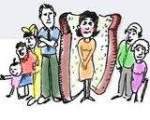“I will tell my daughter what a teacher once told me: she who walks through poopies gets poopies stuck to her. Narcissistic people cut a wide, messy swath. Helping her keep her shoes clean is going to be a mighty task”. ~Shawn T. Smith
Interestingly, in the Bible, a goat was considered a scapegoat after the Jewish priest symbolically placed the sins of the people onto the goat and sent it into the wilderness (Lev. 16). Nowadays we think of a scapegoat as a person or group who takes the blame for others. There is always one or more scapegoats in a cainistic home, taking the blame for Cain so he can appear perfect and without fault.
Sometimes the cainist in the family is one of the children. He is granted special privileges as long as he does what the self-absorbed parent wants. What’s more, the entire family is taught to cater to this cainistic child, sometimes referred to as the Golden Child.
By being placed on a pedestal by the entire family, this privileged child identifies with his exceptional status and believes that the entire world must accommodate him. Nothing is too good for him. All his faults are either ignored or blamed on the scapegoat(s) in the family.
A 1994 episode of the sitcom Friends is a perfect example of this “Golden Child” and scapegoat pattern. Monica invites her parents, Judith and Jack Geller, and her brother Ross for dinner. When she tells her mother, Judith, that she’s making spaghetti, her mother whispers under her breath, “Well, that’s easy.”
As they sit at the dinner table eating, Judith Geller continues to criticize everything about Monica. Ross has some bad news to share with his parents but procrastinates, fearing his parents’ disapproval.
For a brief moment, it appears that Monica’s Dad, Jack, might come to his daughter’s defense when he says, “Don’t listen to your mother. You’re independent and you always have been.” But then he continues. “Even when you were a kid, and you were chubby and you had no friends, you were just fine!”
In the next breath, he begins praising Ross while continuing to disparage Monica. “There are people, like Ross, who need to shoot for the stars, with his museum and his papers getting published. Other people are satisfied with staying where they are. I’m telling you, these are the people who never get cancer. They’re happy with what they have, they’re basically content, like… cows.”
Monica pulls Ross aside and begs him to share his downbeat information which, she hopes, might take the negative attention off her. Finally Ross blurts out his distressing news, telling his parents that his ex-wife, Carol, is a lesbian, living with her girlfriend, pregnant with his child, but plans to give the baby her lesbian lover’s last name.
Both parents stare at each other in disbelief. Then Judith Geller turns to Monica and spats:
“And you knew about this.”
This is all very funny in a sitcom, but that is precisely how it plays out in a cainistic home with the Golden Child and the scapegoat. Even when the favored child is knee deep in error, he can do no wrong and the scapegoat can do no right.
Not only is the scapegoat blamed for the Golden Child’s problem, but the former is treated as if she has no needs and often given the role of care giving (without realizing that is the role she assumes to receive love). Monica was the one fixing dinner and the rest of the family merely needed to show up. Monica was seen as having no needs even when she was fat and had no friends.
Understandably, the Golden Child favors the doting cainistic parent, and the scapegoat, who is blamed for everything, is fearful of both the Golden Child and the self-absorbed parent and becomes the Enabler in an attempt to ward off as much abuse as possible.
This lopsided treatment toward children creates jealousy, envy, and hostility between the siblings. Indeed, Cain has been known to purposely cultivate the rift between the siblings through this favoritism and unfairness so he (the cainistic parent ) can hide behind the Golden Child who abuses the scapegoat. This cheats the scapegoated child from knowing herself and also sets her up to think she deserves abuse in adulthood.

